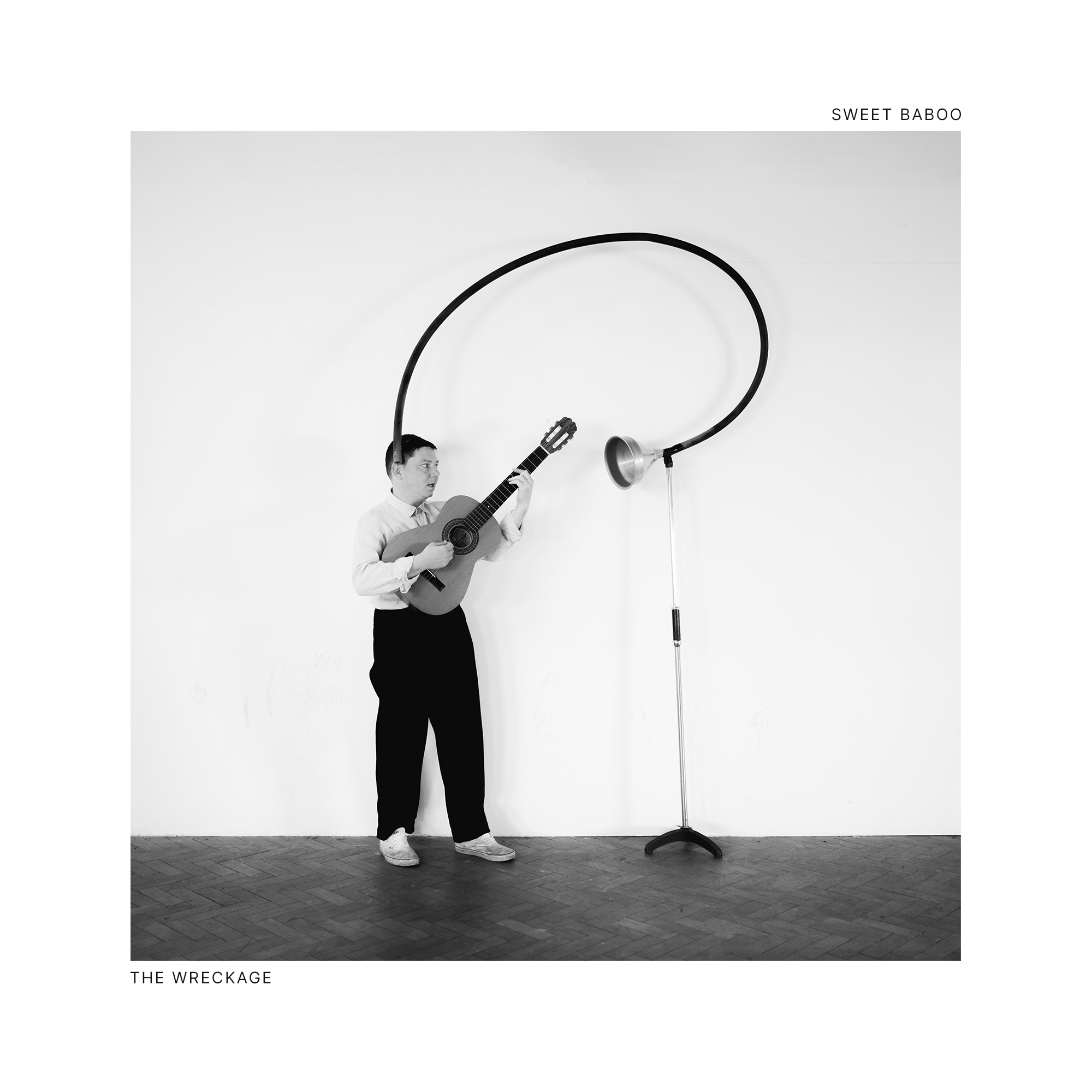The Wreckage
Released on 27 January 2023 on Amazing Tapes from Canton
Catalogue number: ATFC006
Cradling an uncomplicated guitar, a man in trousers of artful proportion pours tender tales into your ear; my ear; the tubes-and-funnels ear of a retrofuturistc listening device. Plucking nylon strings as he sings of waitresses who gaze through checked café windows, weathered fishermen who cast lines under blue-grey skies, and beloved, untameable dogs who stretch their long legs too far from home, is the enigmatic Sweet Baboo: musician as mirage, great beautifier of the mundane; each of his songs an ode to the tragedy and the comedy and the magnificence of life’s minutiae, momentarily appreciated before the world goes spinning on.
Despite several years of contributing to the recorded and live pursuits of other musicians (among them Gruff Rhys, Cate Le Bon and H.Hawkline) — as well as the release of two albums with Paul Jones under the duo’s acid-ambient piano and clarinet project Group Listening —The Wreckage is Stephen Black’s first output as Sweet Baboo since 2017. It is also the first full-length release on Black’s own Cardiff-born-and-baptised record label, Amazing Tapes From Canton. Determined to reconcentrate his energies on his solo music and beholden only to himself, Black took a sledgehammer to the Sweet Baboo foundations; picked through the bricks; turned them over in his hands and mind, and mortared them back together in an unwieldier, more sculptural shape.
Resultantly, The Wreckage is a work of quiet idiosyncrasy; surreal and sidelong observations unassumingly wrapped in the mist of a viscous voice and lush, otherworldly instrumentation. It opens on ‘Hopeless’; an unlikely Welsh-bossa track which whirls in zero gravity, introducing a duality of angst and wry optimism (A meteor coming our way / Or a deadly bite from a rattlesnake / An aftershock from an earthquake / Happiness follows heartache / I hope) which suffuses the whole of the record; it’s there as Black tries to keep his plants alive on ‘Horticulture’, digging / Among the soil and birds and bloom, watering, watching and waiting despite ungreen fingers, and as he marvels at the wildness of the dog straying too far to remember his name (on ‘Herbie’).
The constant tussle of a creative life is crystallised as Black walks the seawalls of his hometown on ‘Take a Left Out of the Door’, waiting round for inspiration, and most viscerally on the title track, in which he laments losing my name / Lost myself in the waves / I swam and I tried / Caught deep up inside. But woe never quashes hope, the two forces pushing and pulling The Wreckage in equal measure, keeping it afloat. Don’t be landlocked, don’t get clipped under your wing / ‘Cause I’m in no hurry to get on with
anything / Leave all your worrying down to me / Let your mind wander be free to dream reassures Rainbow-theme-tune-inspired uplifter ‘The Worry’; I don’t know what’s your beef / Always shouting at the geese / I’ve got your back my friend comforts ‘Goodbye’ — sometimes, just maybe, the addresses to unspecified yous rather more importantly messages of consolation and encouragement for the trepidacious self.
Having been writing and wrestling with The Wreckage alone at home in Penarth for 5 years (4 of them, he declares, procrastinatory) with the barest of tools, Black then took it to at StudiOwz, Clarbeston, Pembrokeshire, fleshing its bones with an impressive extent of self-played instruments (bass, sax, flute, synth, clarinet, piano, Wurlitzer, organ, drum machine, guitar) and additional input from a band of well-established collaborators (Paul Jones of Group Listening on various keys; Jodie Marie and Georgia Ruth on additional vocals; Davey Newington of Boy Azooga on drums and percussion, Huw Evans, aka H. Hawkline, on bass and electric guitar; Black’s dog Herbie on woofs). There too, Georgia Ruth contributed the lyrics to cinematic ballad ‘The Waitress’, which undulates like waves in a Spring tide (I’m a waitress here / And I go walking / Past pink vinyl chairs / Punters peeling them), and Evans gifted the album ‘Good Luck’ — bouncy riffs and xylophones bending around the magical potential of if condensed within a lottery ticket. The record was recorded, mixed, and arranged (jointly with the band) by the multiple-Mercury-award-nominated Jimmy Robertson, noted for his work with the likes of Arctic Monkeys, Anna Calvi, and Late of the Pier.
The album’s cover, devised by Emma Daman Thomas (of the band Islet), poses Sweet Baboo in homage to a 1920 photograph of the actor, acrobat and physical comedian Buster Keaton, master of the poignant absurd, playing music directly back into his own ear — and there is no more perfect a visual metaphor for The Wreckage to be hoped for. For it belies the unseen exertion, introspection and perfectionism at play in works which observe, question, make light of and reflect back beautifully the world; making sense, for both creator and consumer, of the debris within and without.
Diva Harris, August 2022
